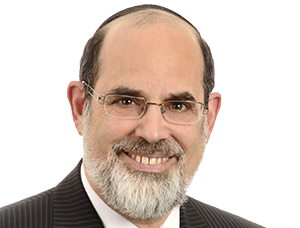A small detail in Quebec’s new language legislation will have “enormous repercussions” for the Jewish community, says the lawyer who made a last-ditch effort to have that clause modified.
Gregory Bordan was unsuccessful in persuading the government to maintain the longstanding flexibility afforded to rabbis from outside Canada who take positions with synagogues here as temporary residents.
For many years—at least 20 and possibly 40 or more, according to Bordan—the children of these rabbis were permitted to attend English schools for three years, a period that could be extended by that duration, if the rabbi’s job description remained the same.
That extension has now been eliminated with the passage of Bill 96, which strengthens Bill 101, the Charter of the French Language that contained a loophole allowing rabbis’ kids to remain in English schools for up to six years.
Bill 101 otherwise allows only children who have at least one parent who attended an English school in Canada for the majority of their elementary education to go to an English school—whether public or private.
Bordan said there is little likelihood anything can be done now to revert to the previous state of affairs. The extension possibility has been dropped from within the law itself, rather than in a regulation, which would have made it easier for a future government to make an amendment.
The tighter restriction on English education for foreign nationals comes at a time when the Montreal Jewish community’s ability to attract and retain congregational rabbis is becoming more difficult, Bordan said.
Mainstream Ashkenazi synagogues have relied heavily on hiring rabbis from outside Canada, mostly the United States and to a lesser extent, the United Kingdom and Israel—and that, in itself, has never been easy given the political climate in Quebec and an aging community, on top of a weaker Canadian dollar.
In the past couple of years, the situation has become even more challenging due to the worldwide shortage of rabbis. “The pool of experienced rabbis is very, very small today,” said Bordan.
Assuring access to an anglophone Jewish school for a reasonable period is essential to even having a chance in the stiff competition for rabbis throughout North America.
Forcing children to switch to a French school after three years is not only disruptive, but there may not be a francophone Jewish school that is consistent with the family’s religious observance.
On May 3, Bordan and Rabbi Michael Whitman of Congregation Adath Israel asked the government for a minor alteration of Bill 96 they say would solve the problem. They received no response.
Their appeal noted that the largest modern Orthodox synagogue in Montreal, with almost 1,000 members, has been directly affected by the restriction on English schooling.
They are referring to Congregation Tifereth Beth David Jerusalem, which Bordan attends. Its spiritual leader, Rabbi Yechezkel Freundlich, is leaving this summer after six years for a synagogue post in the United States, where he is from.
The “school challenges” for the younger of his seven children is among the factors in his decision, he told congregants.
Rabbi Mark Fishman of another large modern Orthodox synagogue, Congregation Beth Tikvah, is also leaving after 12 years. The U.K. native is heading to Israel.
Shaare Zion-Beth-El Congregation, the flagship of Conservative Judaism in Montreal, has been without a permanent rabbi since last summer for its 750 members. It just announced that it has hired an interim rabbi—from the United States—for a one-year period starting in July and will resume its search for a permanent one in September.
Bordan and Rabbi Whitman argued that the change they wanted would have had virtually no effect on the bill’s aim of promoting French as relatively few people would benefit, but those small numbers are critical to the Jewish community’s vitality.
“The consequences could be quite severe in the long run; the community’s cohesion and identity will disappear,” said Bordan, who also represented some complainants in the case against Bill 21, the state secularism law.
“Rabbis play an essential role within the community, even those who don’t practise would feel their loss. Without this resource, the community will inevitably and irreversibly deteriorate.”
Bordan and Rabbi Whitman turned to B’nai Brith Canada for help. Marvin Rotrand, national director of its League for Human Rights, wrote on May 4 to Benoit Charette, the minister responsible for fighting racism, pleading the community’s case, with copies to Simon Jolin-Barette, minister responsible for the French language, and David Birnbaum, the Liberals’ critic for relations with anglophones. Rotrand has not received a response.
“The Jewish community needs stability,” wrote Rotrand, “which means when a new rabbi is approached, it is in the hope that the candidate will stay for the long term and not leave after a few years. We agree… Bill 96 hampers the Jewish community’s ability to recruit rabbis from outside Quebec.”
Rotrand was also approached about this issue by the Rabbinical College of Canada, the Lubavitcher yeshivah. However, Bordan does not think the exemption and its extension applied to teachers.







